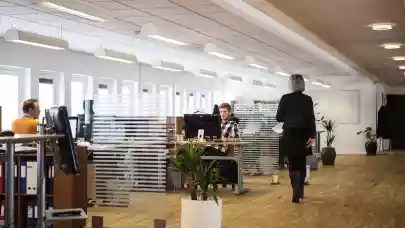
Silviu Stratulat, Managing Partner, Stratulat Albulescu spoke to Property Forum about the impact of the crisis in Ukraine on the CEE real estate market, but also about the bank financing environment for developments amid rising interest rates. The law firm is planning to boost the logistics segment in its portfolio and expand with a new office in Moldova.
This interview was first published in Property Forum’s annual listing of "The 50 most influential people on Romania’s real estate market”.
What does Stratulat Albulescu’s real estate client portfolio look like at the moment and what contribution do you estimate it will make to the company’s overall result this year?
The real estate practice has always been a strategic area for our firm and therefore an important revenue generator with a share of total revenues varying from year to year between 27 and 35%. At the same time, the department’s large team has enabled us to address the full spectrum of projects in the market including investment and rentals, as well as commercial and residential real estate. This has facilitated the consolidation of an extremely varied client portfolio that includes local and regional developers, investment funds, construction firms and family businesses.
Have you noticed any changes in the level of service demanded by real estate companies in the two years of the pandemic? What will happen now that all restrictions have been removed?
The pandemic period will certainly be an object of study for sociologists and anthropologists in relation to a variety of levels of affected societies and economies. I do not believe that real estate will be one of these areas, with all the determination of the business community to constantly highlight its effects on the real estate sector, especially in the office segment. For the most part, the behaviour of market players has remained unchanged, with projects and transactions completed during 2020, 2021 and 2022 showing that there have been numerous office space rentals, transactions with properties in the same use category, land or shopping centres. The associated legal services remained broadly the same.
The return to office is the most interesting phenomenon in the context of the removal of restrictions and, even subject to a hybrid work schedule, this will happen at a more or less accelerated pace, depending on the branch of the economy to which we refer. What every employee and employer alike need to understand is that, except in certain particular situations, we cannot have harmonious professional development without direct interaction in a professional working environment. I believe that working in a team is a prerequisite for the success of those who want to progress.
What role could the crisis in Ukraine have on the perception of real estate investors regarding the Central and Eastern Europe (CEE) area, including Romania?
The conflict in Ukraine will certainly dampen the appetite of some investors for the CEE area, especially those from far-flung areas such as the United States or Asia. On the other hand, investors from countries with constant exposure to conflict risk, and others generally less risk-averse, are likely to see this period as one that can bring opportunities, and as a result, may wish to speculate accordingly. What is certain is that the involvement of a single NATO country in the conflict would lead to an instant freeze in real estate markets across the CEE area in the negative scenario.
Romania has entered the stage of raising key interest rates to reduce inflation. What could this mean for bank lending conditions for property developers?
Fortunately, the financial situation of real estate developers now is much different than in 2007-2008, with many of them having sufficient liquidity to start or continue their projects and in the absence of bank financing that could become too onerous by raising interest rates above a certain margin. For those relying on bank financing, however, things will not be rosy, as the profit or return margins they were looking at will shrink considerably or even disappear in some cases.
For the residential segment, however, rising prices for building materials are the biggest cause for concern or discouragement in relation to development plans.
What are the solutions for investors who want to start projects in Bucharest, given the situation of the Urban Zoning Plans (PUZ)?
They should be patient. Individuals or groups at the helm of central local authorities and some sectoral town halls are currently totally opposed to dialogue and identifying solutions that could unblock the situation of the new urban planning regulations. Unfortunately, they are equally opaque and reluctant to exercise their public service and duties when it comes to managing the permitting processes for projects under existing legislation.
However, for anyone who feels that their rights have been violated or disregarded, my advice to them is to take recourse to the courts because sometimes passivity and waiting will not do anyone any good. The situation also disadvantages the local authority, which will reduce or limit its receipts to the local budget through this general stagnation of development in Bucharest.
Which real estate segments are best represented in the current client portfolio, and do you think there will be significant changes this year?
The residential and retail areas remain the most important for our practice, followed closely by the logistics and office segments. However, by the end of the year, we expect the logistics area to increase in weight and at least overtake the residential area.
What do you see as the biggest opportunity in the local real estate market?
It is the underdevelopment in all segments and in all respects. If we look at asset classes, the hotel segment, the student or retirement home segment and provincial retail will probably remain the most attractive. The logistics space segment is already highly coveted and exploited and I believe that, while still attractive, it may no longer represent an opportunity in the true sense of the word.
How can Romania attract more institutional investors in real estate, especially in the residential area?
The efficiency, homogenisation and stability of legislation, the openness of central and local authorities to dialogue and the accelerated digitisation of public institutions are the most important measures that need to be adopted or implemented to create a favourable framework for institutional investors.
Romania must also allocate significant budgets to promote itself in the international real estate environment and ensure constant and continuous participation in trade fairs and conferences in order to raise its profile and promote its attractiveness.
What development plans does Stratulat Albulescu have for the coming years?
As the interview goes to print, we will have already announced the opening of our office in Chișinău, an endeavour that has involved considerable effort and which, despite the shortcomings of the moment, will help generate new client flows and revenue for the firm.
With 50 lawyers in both offices, we are positioning ourselves as a relevant law firm for the entire geographical area and not just Romania. Our intention, however, is to exceed 60 lawyers by the end of the first quarter of next year, with at least 15 to be dedicated exclusively to the real estate practice.



